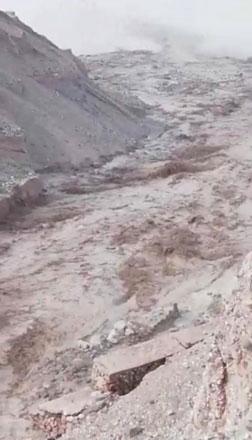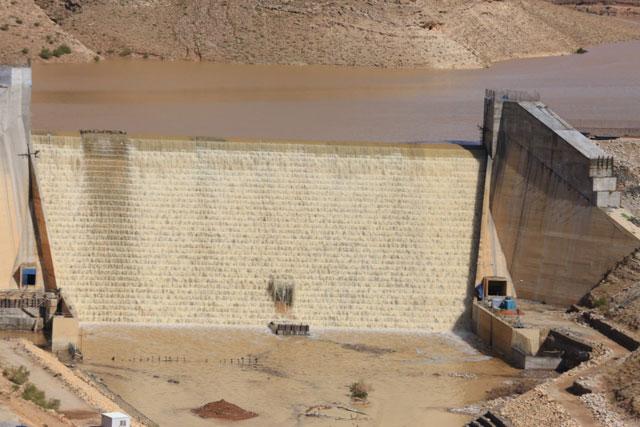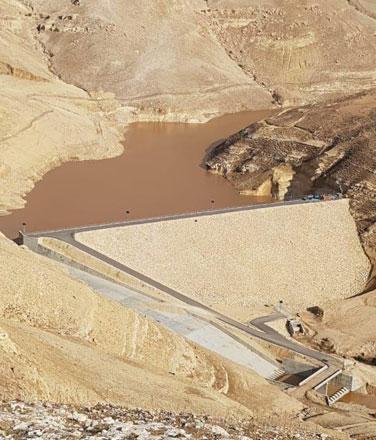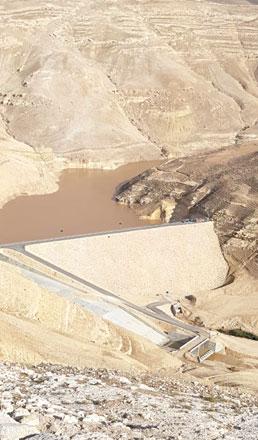You are here
Floods damage water pipeline denying thousands of households their weekly supply
By Hana Namrouqa - Oct 27,2018 - Last updated at Oct 27,2018

Screenshot of flashfloods from the Zarqa-Maeen Valley pouring into the Dead Sea
AMMAN — Several thousand households in Amman’s western and southern parts will not receive their share of water this week under the water distribution programme, as one of Jordan’s main carriers was damaged in Thursday’s tragic flashfloods, which claimed the lives of 21 people, the government said on Saturday.
Gushing rainwater from the mountains of the capital, Madaba and Maeen flooded the Zarqa-Maeen Valley, where students, teachers and tour guides on a school trip were hiking. The flashflood swept away students and families in the area of the hot springs on the opposite side of the Dead Sea, 21 people lost their lives and 43 others were injured, while the search to find a missing girl from the school trip was still ongoing as of Saturday evening.
The raging water damaged a bridge on the main street alongside the Dead Sea and also damaged the Zarqa-Maeen water conveyance pipeline, which transfers water from the Zarqa-Maeen Dam and other sources to the Zarqa-Maeen Water Treatment Plant, located near the northern tip of the Dead Sea.
“The part of the pipeline near the collapse site was damaged. We suspended transferring water via the pipe to allow technicians to repair that damaged part. Technical teams started repairing the pipe on Friday and work since then has been ongoing,” Ministry of Water and Irrigation Spokesperson Omar Salameh, told The Jordan Times.
Fixing the pipe will take at least a week before it is operational again, Salameh said.
“The Zarqa-Maeen Water Treatment Plant is one of Jordan’s strategic water sources. The plant supplies Amman with 30 per cent of its water needs, of course water allocations to households will be affected this week,” Salameh added.
Some subscribers will receive less water than they usually receive under the weekly distribution programme, while others will not receive water at all this week in Amman’s western and southern parts.
Under the distribution programme, Jordanian households receive water once every set period, usually a week to 10 days, on a rotating basis. Scarce water resources in the country compelled the Kingdom to initiate the programme in the early 1980s to conserve limited resources and ensure a sustainable supply of water for subscribers.
“We will reallocate water from Amman’s resources to cover for the huge shortage this week,” he underlined.
Amman receives its daily water supply from several sources such as Zarqa-Maeen, Disi Water Conveyance Project, Qastal Wells, Qatraneh, Swaqa and the Zai Water Treatment Plant, which is the capital’s major water provider, supplying 40 per cent of its drinking water.
The $125 million Zarqa-Maeen Water Treatment Plant, which provides the capital with 45 million cubic metres of water annually, was completed in 2007. The project was designed to increase potable water supplies to the capital and the Dead Sea’s tourist areas by 40 per cent, benefitting 2.5 million people.
The Zarqa-Maeen facilities, 74 per cent of which are funded by USAID, treat saline water collected from three nearby wadis — Mujib, Zarqa and Maeen — which are delivered to the site under a separately funded Jordan Valley Authority project.
A 41-kilometre pipeline conveys 110,000-115,000 cubic metres of water daily to the greater Amman area.
Related Articles
AMMAN — The weekend’s rain channelled more than 9 million cubic metres (mcm) of water into the Kingdom’s 14 major dams, raising storage leve
AMMAN — Official reports and site inspections proved that the Zarqa-Maeen Dam, rumoured to have caused or worsened late October’s Dead Sea t
AMMAN — The Ministry of Water and Irrigation on Saturday denied as baseless news reports circulating on social media claiming the ministry o


















